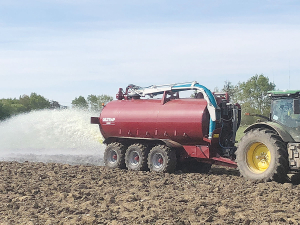DairyNZ Calls for Changes to Government’s Proposed Resource Management Act Reform
DairyNZ says the Government’s proposed Resource Management Act reform needs further work to ensure it delivers on its intent.
 When making the decision to install or upgrade a farm dairy effluent system it’s important to ask the right questions.
When making the decision to install or upgrade a farm dairy effluent system it’s important to ask the right questions.
Choosing the right effluent system requires professional advice, considering future plans, and picking the right person for the job.
When making the decision to install or upgrade a farm dairy effluent system it’s important to ask the right questions, gather information and take professional advice.
You want the system to work well for many milking seasons to come so it’s important to consider the following:
Planning the right system is important.
One system is the travelling irrigator – the traditional design with a stormwater diversion in place at the yard. The effluent flows from the yard through a stone trap to a storage facility either via gravity feed or pump. It is then irrigated to land using a travelling irrigator. It’s best suited for farms with no landscape/ climate/ soil risk factors, freely drained soils, flat to gently sloping ground, moderate labour input and also for regular shaped paddocks.
Another system is the low-rate sprinkler with mechanical separation.
This system has a storm water diversion at the yard. The effluent then flows through a stone trap to a mechanical separator where the solids are removed. The liquid is then pumped to storage and irrigated to land via a small number of low-rate applicators that are moved frequently.
This is best suited for farms that require flexibility in application depth and rate, such as high-risk soils, high rainfall areas or sensitive catchments, especially suited to poorly drained or artificially drained soils, all slopes and works well in small or irregular paddocks.
The muck spreader system typically includes a storm water diversion then flow through a stone trap to a storage facility. A pump station is required if there is no gravity to storage. Effluent is stirred and sucked from storage into a muck spreader truck and sprayed to land.
This is best suited for smaller farms and lower cow numbers, or when applying effluent to remote areas, all types of soils and flat to sloping land.
Article by DairyNZ
Budou are being picked now in Bridge Pā, the most intense and exciting time of the year for the Greencollar team – and the harvest of the finest eating grapes is weeks earlier than expected.
The Real Estate Institute of New Zealand (REINZ) has released its latest rural property report, providing a detailed view of New Zealand’s rural real estate market for the 12 months ending December 2025.
Rural retailer Farmlands has released it's latest round of half-year results, labeling it as evidence that its five-year strategy is delivering on financial performance and better value for members.
OPINION: "We are back to where we were a year ago," according to a leading banking analyst in the UK, referring to US president Donald Trump's latest imposition of a global 10% tariff on all exports into the US.
DairyNZ says the Government’s proposed Resource Management Act reform needs further work to ensure it delivers on its intent.
Overseas Trade Minister Todd McClay says he's working constructively with the Labour Party in the hope they will endorse the free trade agreement (FTA) with India when the agreement comes before Parliament for ratification.
OPINION: Expect the Indian free trade deal to feature strongly in the election campaign.
OPINION: One of the world's largest ice cream makers, Nestlé, is going cold on the viability of making the dessert.